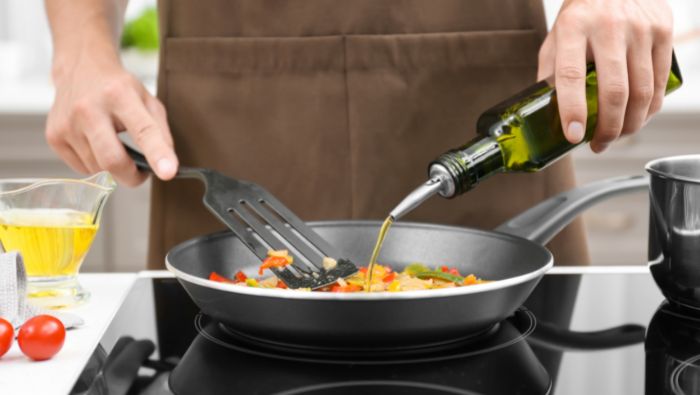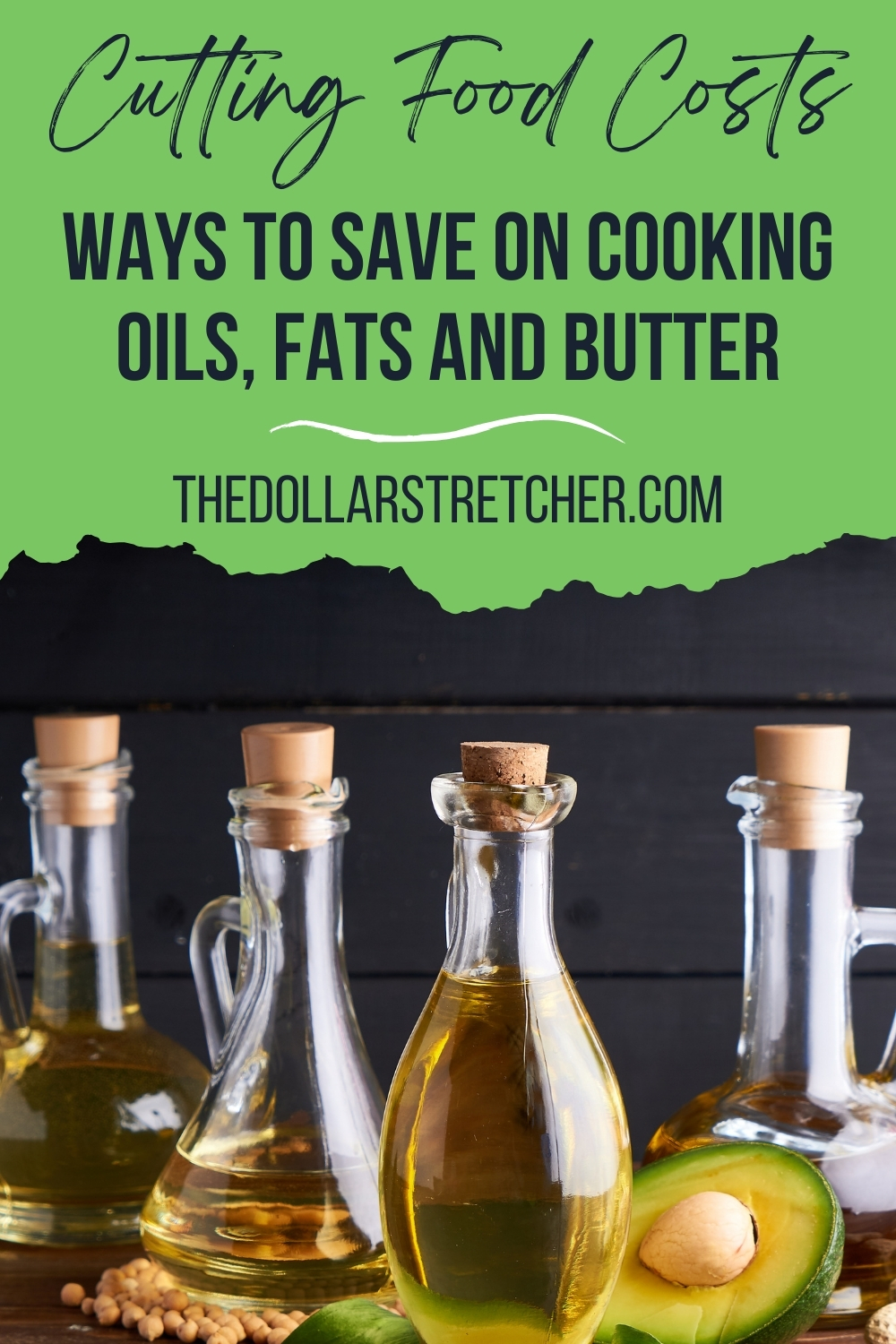Ways To Save on Cooking Oils, Fats and Butter
Are your cooking methods costing you too much money right now? They might be if you use a lot of cooking oils, fats, and butter in the kitchen. Here are some ways to save.
by Andrea Norris-McKnight

Thanks to inflation and shortages, oils, fats and butter are one category of grocery items that have seen a significant price increase. Whether you prefer vegetable oil, lard, olive oil, or butter for cooking, these products we use almost daily are putting a considerable dent in the grocery budget.
Vegetable oils saw the most significant price increases the past few years, according to The Washington Post. In 2023, supply deficits mean prices will likely remain high.
According to the USDA, we’re finally starting to get a little relief on the cost of milk and butter, although we shouldn’t expect any significant price drops in the latter half of 2023.
Here is a look at ways to save money on oils, fats and butter for cooking.
Keep in mind that the goal of saving money often conflicts with the goal of eating healthier. That is certainly the case with cooking oils and fats. For example, olive, avocado and almond oil are healthier and often more expensive than vegetable, peanut, and canola oil.
So while this article primarily focuses on cheaper and sometimes less healthy fats and oils, sacrificing your health to save money is never a good trade-off.
Sign Up for Savings
Subscribe to get money-saving content by email that can help you stretch your dollars further.
Twice each week, you'll receive articles and tips that can help you free up and keep more of your hard-earned money, even on the tightest of budgets.
We respect your privacy. Unsubscribe at any time.
Cook With the Cheapest Butters, Oils and Fats and the Least Expensive Cooking Methods
Sometimes, finding the most significant savings in the kitchen is about knowing how to prepare foods the cheapest way. For example, vegetables can be steamed, sautéed, roasted, etc. Steaming doesn’t require any oil, so you can steam vegetables for less than you can sauté them. When it comes to fried foods, you can often find baked versions of the same recipes that require little to no oil.
If you prefer the taste of sautéed veggies over steamed, depending on prices, it might be cheaper to sauté veggies in butter rather than oil. Roasted vegetables may taste best with olive oil, but you can often combine olive oil with cheaper vegetable oil and achieve almost the same flavor.
You might have to do a little experimentation in the kitchen, but you’re sure to come up with cheaper ways to prepare your favorite foods.
If you don’t know how much you’re paying for ingredients, you won’t know how much your meal preparation methods are costing you. Be sure to track what you’re paying for butter, fats, and oils to ensure you’re preparing meals using the least expensive cooking methods and ingredients.
Reuse Bacon Grease
If you cook bacon and are not saving and reusing your bacon grease, you are throwing out a significant source of savings. Bacon grease can be used in the place of butter when frying or sautéing foods. Depending on your tastes, it can even be used in some baking recipes, such as for biscuits.
Southern Living recommends taking the following steps to store bacon grease safely:
- Get rid of any small bits of bacon that are left behind.
- Strain the grease through a coffee filter placed snugly inside the mouth of a mason jar. Be careful if the grease is still hot enough to burn skin.
- Slowly pour the warm bacon grease into the jar so the coffee filter traps any small bacon pieces remaining in the grease.
According to Southern Living magazine, bacon fat can be stored for up to three months in the refrigerator or the freezer indefinitely. The best place to keep it is in the fridge, which will keep it soft. Just date the container, so you know when to throw it out.
Reuse Frying Oil
To save money when frying foods, always use cheaper oils such as vegetable and canola unless you have dietary restrictions or do a lot of frying that would make it healthier to use olive or another type of healthy oil.
When it comes to saving oil, you typically want to reuse saved oil for the same purpose you used it the first time.
For example, save the oil used to fry vegetables to fry more vegetables. Save oil used to fry fish to fry more fish. This is primarily because fry oil will often hold the flavor of the foods fried in it. So unless you don’t mind your homemade French fries tasting like fish, reuse your saved fry oil for the same purpose.
Take the following steps from Bon Appétit to save frying oil. They are similar to those for keeping bacon grease:
- Allow the oil to cool completely to room temperature.
- Strain the oil by pouring it through a fine-meshed sieve lined with a couple of layers of cheesecloth to catch any of that fine matter left behind after your first fry.
- Store the strained oil in a clean container, such as a glass jar or the bottle the oil came out of. Use a funnel to help make the process neater.
Store the oil in a cool, dry place. You can reuse this oil a few times before you have to dispose of it. However, with each high-heat application, the oil breaks down further and will continue to take on the taste and smell of whatever you’re cooking.
AmericasTestKitchen.com says you can reuse oil three or four times for frying breaded or battered foods. You can reuse oil as many as eight times or more for other foods.
When the oil starts to get cloudy, dark or gummy, discard it. However, the most telling feature of spent oil will be its smell: once it smells rancid or sour, it’s time to dispose of it.
Stock Up On Butter and Freeze It
According to USDairy.com, you can freeze butter. With proper storage, you can freeze unsalted butter for up to five months and salted butter for up to nine months. So stock up when butter is on sale, and you have coupons.
Savings for Those With Dietary Restrictions
Dietary issues can make it hard to save on oils if you cannot eat bacon grease or vegetable and canola oils. In this case, your best source of savings will likely be watching for store sales on healthier oils or buying in bulk.
How To Save Money on Cooking Oils, Fats and Butter
To summarize the tips for saving money on cooking oils, fats, and butter:
- Use cheaper oils for cooking and reserve expensive oils, such as olive oil, for dressings or other recipes in which the taste of the oil will make a significant difference in the outcome of the recipe.
- Cook with less oil. For instance, sautéing will require less oil than frying.
- Learn to cook without oils and fats.
- Know how to properly store oils.
- Reuse oils and bacon fat.
- Stock up on butter and store it in the freezer.
Reviewed July 2024
Popular Articles

On After50Finances.com
- 9 Things You Need to Do Before You Retire
- You Didn’t Save Enough for Retirement and You’re 55+
- When Empty Nesters Reorganize and Declutter Their Home
- Reinventing Your Career in Your 50s or 60s
- What Mature Homeowners Should Know about Reverse Mortgages
- 2 Reasons to Collect Social Security Benefits As Soon As Possible


